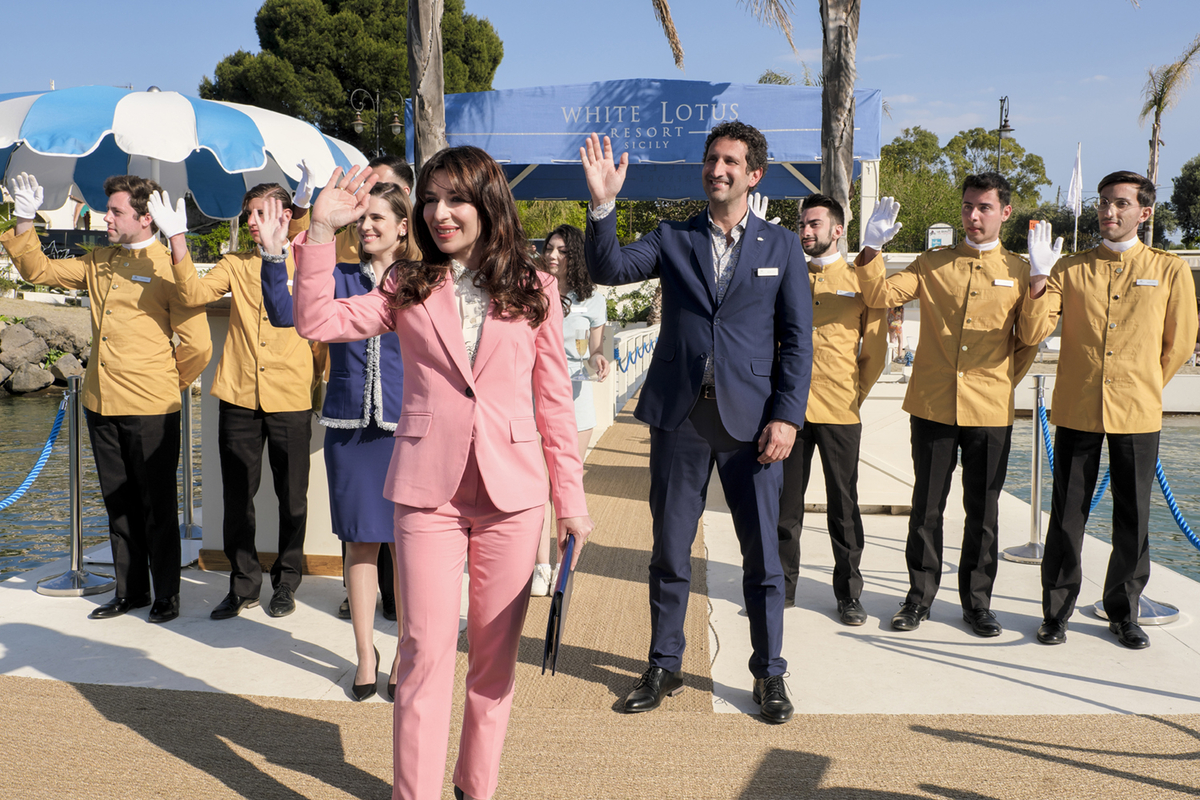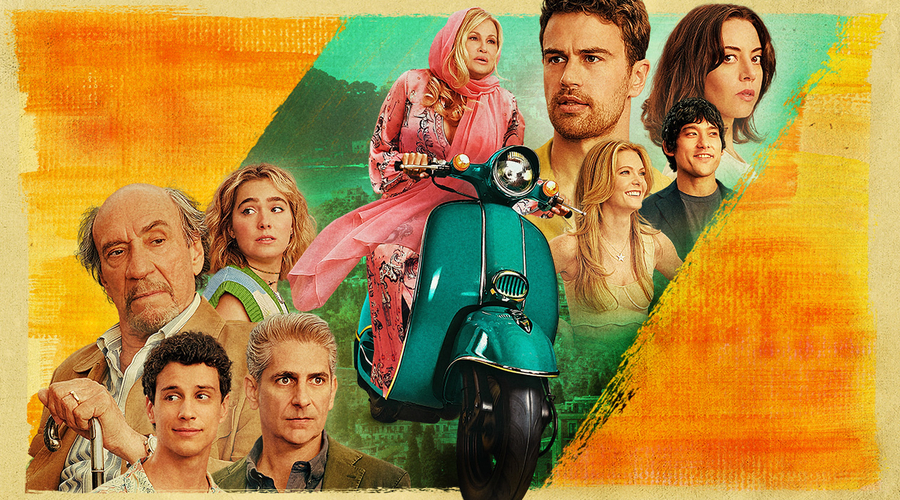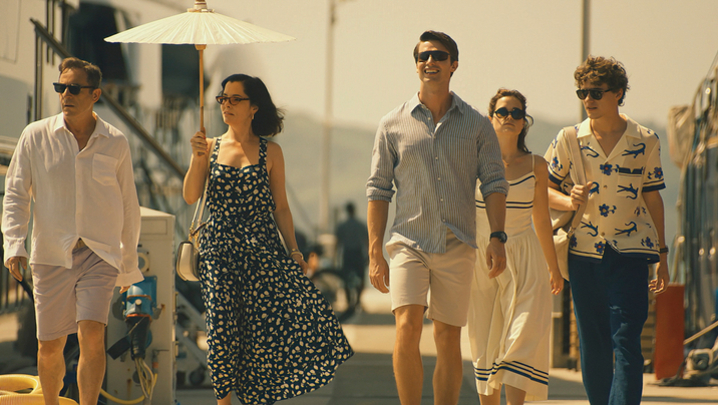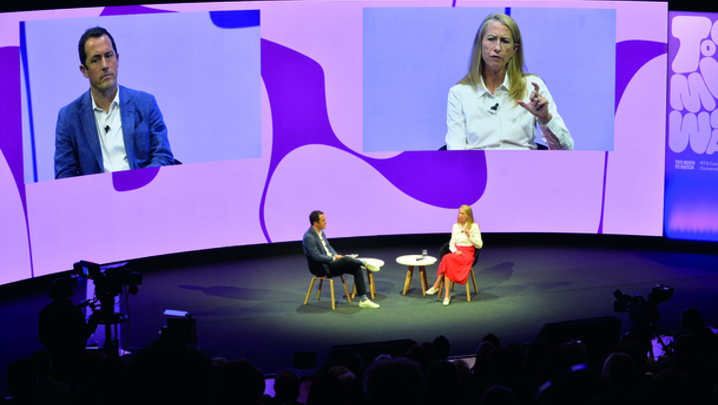As The White Lotus returns for a second run, Steve Clarke analyses the unsettling TV satire that dominated this year’s Emmys.
White privilege, sexual identity and racial dynamics were among the themes served up alongside the infinity pools and swanky cocktails at an uber-luxurious Hawaiian hotel in the first season of Mike White’s lacerating satire, the Emmy-garlanded The White Lotus.
In season two, which began at the end of last month, the location switches to sun-soaked Sicily. Once again, we are in the company of a group of rich Americans holidaying in a luxury hotel and trying their hardest to make paradise work for them.
Their pursuit of the good things in life comes alarmingly unstuck, however, when one of the guests discovers several dead bodies floating in the Mediterranean. Cut to a week earlier, when the well-heeled holidaymakers arrive at the eponymous hotel.
The device will be familiar to those of us who were bowled over by the original series. It, too, started out with a dead body and then flipped back in time by seven days.
On the evidence of episode one, season two of The White Lotus will focus far more sharply on the carnal appetites of its subjects than did its predecessor. But this being a show written by Mike White, don’t expect much in the way of real romance as the sex drives of his characters leave us feeling queasy. Without much fanfare, we are dropped into a storyline involving the local sex trade – and an 80-year-old man repeatedly hitting on women barely old enough to be his granddaughters is hardly Love Actually. Not for nothing has White been described as “an auteur of uneasiness”.
For a sequel, this latest instalment of The White Lotus is unusual in that it resurrects only one of the cast members from the first series – Jennifer Coolidge, who gives an immaculate performance as Tanya, the needy, alcoholic heiress with an eating disorder.
In its original incarnation, The White Lotus was a show that reminded us of television drama’s ability to disembowel our troubled times and refashion them for entertainment. Season one engaged with a range of sensitive topics that are very much part of the zeitgeist. All the more puzzling, then, that in the UK it has taken the show’s awards success for the series to finally register on the radar of British TV viewers.
“It’s the show that every TV executive is talking about,” said one well-placed Brit in the industry recently. What took them so long? The sheer quantity of classy TV drama series shown in recent years is perhaps one explanation, and a fine example of TV’s intense battle for viewers. A second reason may be the fact that The White Lotus premiered in the UK on Sky Atlantic in mid-August 2021, just when many British media folk were taking their first holiday since the start of the pandemic.
In the US, The White Lotus, commissioned by HBO, was a word-of-mouth hit prior to punching through at the Emmys in September: White won for writing and directing; Coolidge and Murray Bartlett scored in the acting categories; and the show itself carried away the Outstanding Limited Series award. Not a bad haul for a show that has been something of sleeper hit in the UK.
The White Lotus was itself a child of Covid. As the pandemic closed sets on both sides of the Atlantic, HBO approached White to see if he had any ideas that could be quickly turned into a show. HBO had one other stipulation – the programme would have to be filmed in a single location that could support a Covid bubble.
White, who learned his craft in writers rooms on shows such as the US high-school drama Dawson’s Creek, started work on the script at the end of the summer in 2020. Filming began in the high-end setting of the Four Seasons Maui in Hawaii just two months later. Subsequently, he described the scripts as “basically first drafts”.

White has said that The White Lotus engages with the idea that, no matter where we are, even holidaying in a tropical paradise, there is no avoiding ourselves or our present predicament.
“That idea of being transported away really was the inspiration for the show as much as anything, and [it’s] why the music is the way it is,” he told Vulture website. “You go to these places, [on] this hunt for escapism, but there’s this feeling of existential dread that permeates the experience. The waters are rising here, too. There’s no getting away from it all. There’s no mystery any more.”
With his characters holed up in Hawaii in the sumptuous – and exquisitely photogenic – hotel, White gave us a scintillating critique of the upper reaches of American society that was both hilarious and deeply unsettling.
Season two promises more of the same; whether the characters turn out to be as fully realised as those who featured in the original show remains to be seen. Bartlett’s scene-stealing performance as the hotel manager, Armond, set the bar extraordinarily high. His botched attempts to placate his most demanding guest led to Fawlty Towers-style high camp (well, The White Lotus is set in a hotel) – and, in the final episode, one of the funniest scenes you are likely to see on TV this year.
To execute this kind of dysfunction successfully on screen, it probably helps to have experienced some of it personally. It therefore comes as no surprise to learn that White, now in his early fifties, is no stranger to mental illness. In 2004, after making a name for himself, he had a nervous breakdown while working on a TV show that was proving problematic.
He became a patient at a psychiatric hospital and the show was cancelled. “I felt weak and lost, like a screw-up, and, at the same time, coming out of it, I felt like I’d been given a huge gift,” he told The New York Times in 2011.
White was brought up in Pasadena, California, the son of a minister and ghostwriter for evangelical Christian leaders. When White was 11, his father came out as gay to his family, but remained in the closet to protect his job in the church until his children completed their education.
Among White’s early successes was the movie School of Rock (2003), starring Jack Black, subsequently rebooted as a musical and TV show. White wrote and acted in the acclaimed Jennifer Aniston vehicle The Good Girl (2002). In 2011, he created the edgy HBO series Enlightened, which starred Laura Dern and laid down some of the tropes that were resurrected for The White Lotus, with the action veering from dark satire to pure comedy.
Remarkably, White wrote and directed every episode of The White Lotus, a feat he pulled off with both season two and Enlightened. No writers room collaboration and compromises here. Producers talk a lot about protecting the writer’s vision/voice in TV drama. Well, here it is, the real thing undiluted by second guessing what an audience or a commissioner really, really wants.
Finally, mention must be made of Cristobal Tapia de Veer’s outstanding and highly original score – memorably described by Vanity Fair as “foreboding waves of twitchy rhythms and tribal chants that seem to engulf the resort’s guests at regular intervals”. White said he wanted it to “feel like a tropical anxiety attack”.
Season one of The White Lotus is must-see television, a disturbing treat that speaks to our dark times and their preoccupations. Miss it at your peril.
Whether the second series can hit the high notes of the first remains to be seen, but the reviews so far have been ecstatic and I, for one, will be tuning in.
Season two of The White Lotus launched on Sky Atlantic on 31 October.







